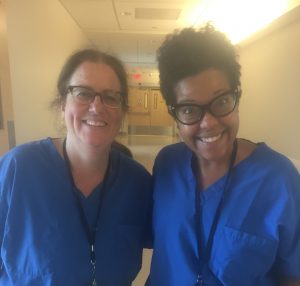
F.A.Q.
Midwives represented by ACNM must earn a graduate degree in Midwifery. Most Certified Nurse-Midwives (CNMs) and Certified Midwives (CMs) have a Master’s degree and some have a Doctorate. After finishing midwifery graduate school, midwives must pass the same exam provided by the American Midwifery Certification Board (AMCB) to obtain national certification and be able to become licensed in the state where they intend to work.
While midwives are trained in providing evidence-based care to low-risk pregnant women, obstetricians are trained to manage all types of pregnancies with an emphasis on high-risk medical complications and surgery. CNMs/CMs are also trained in primary care and preventive medicine. They perform annual exams, gynecologic exams, contraceptive care, screening for sexually-transmitted infections and cervical cancer, and nutrition counseling among other services. Most midwives work in group practices in collaboration with obstetricians, with whom they consult when complications arise.
Midwives also have a personalized, woman-centered, holistic approach to women’s health. They work in partnership with their clients, providing the necessary tools and resources for women to make the best decision for themselves and their families. The medical model of care is sometimes unidirectional and focuses on treating disease and managing complications.
More than 50% of CNMs/CMs work in hospitals or as part of a collaborative practice alongside physicians. Midwives also provide care in clinics and birth centers or have their own midwifery practice. Some midwives also attend home births.
In 2017, 94.1% of midwife-attended births occurred in hospitals, 3.2% occurred in freestanding birth centers, and 2.6% occurred in homes (ACNM, 2019).
No. CNMs and CMs provide both primary and gynecological care in addition to care during pregnancy and birth. From preventive medicine to managing high-risk patients in collaboration with their back-up physician, midwives provide a wide range of services to women from adolescence through menopause. Indeed, many senior midwives have been honored to care for up to three generations of women in the same family, fulfilling both their maternity and gynecologic needs throughout their lifetime.
In New Jersey, CNMs have prescriptive authority, meaning they can prescribe a full range of medications and order tests. Currently, CMs do not have prescriptive authority in NJ but can order tests such as laboratories, ultrasounds, and imaging studies following clinical practice guidelines. The ACNM is working toward approval of prescriptive privileges for CMs in NJ.
Yes. Midwives are experts in measures and techniques that help people cope with the discomfort of labor. During prenatal visits, midwives explain how people can prepare for labor and birth and provide them with resources that may facilitate the process. Whether someone decides to have a natural, medication-free labor and birth or request IV pain medication or an epidural, midwives will be there with them supporting their informed choices.
Midwives…
- Have lower rates of cesarean sections, epidurals, episiotomies, and assisted vaginal births.
- Have higher rates of successful vaginal birth after cesarean section (VBAC).
- Have a holistic, woman-centered, and evidence-based approach to women’s health.
- Advocate for non-intervention unless it is medically necessary.
- Offer you one-on-one labor support and non-pharmacologic comfort measures.
- Attempt to build a relationship with their clients and empower women, working with them as partners in health decisions.
- Promote continuity of care throughout pregnancy, birth, the postpartum period, and a lifetime.
- Provide culturally sensitive care in order to meet an individual’s needs as a person and as a family.
